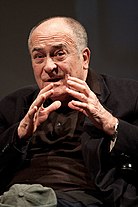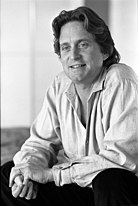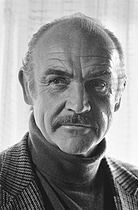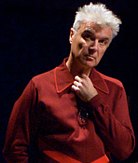60th Academy Awards
| 60th Academy Awards | |
|---|---|
 Official poster | |
| Date | April 11, 1988 |
| Site | Shrine Auditorium Los Angeles, California |
| Hosted by | Chevy Chase |
| Produced by | Samuel Goldwyn Jr. |
| Directed by | Marty Pasetta |
| Highlights | |
| Best Picture | The Last Emperor |
| Most awards | The Last Emperor (9) |
| Most nominations | The Last Emperor (9) |
| TV in the United States | |
| Network | ABC |
| Duration | 3 hours, 33 minutes[1] |
| Ratings | 42.2 million 29.4% (Nielsen ratings) |
The 60th Academy Awards ceremony, presented by the Academy of Motion Picture Arts and Sciences (AMPAS), took place on April 11, 1988, at the Shrine Auditorium in Los Angeles beginning at 6:00 p.m. PDT. During the ceremony, AMPAS presented Academy Awards (commonly referred to as Oscars) in 22 categories honoring films released in 1987. The ceremony, televised in the United States by ABC, was produced by Samuel Goldwyn Jr. and directed by Marty Pasetta.[2][3] Actor Chevy Chase hosted the show for the second consecutive year.[4] Two weeks earlier, in a ceremony held at the Beverly Hilton in Beverly Hills, California, on March 27, the Academy Awards for Technical Achievement were presented by host Shirley Jones.[5]
The Last Emperor won all nine awards it was nominated for, including Best Picture and Best Director for Bernardo Bertolucci.[6] For their performances in Moonstruck, Cher and Olympia Dukakis won Best Actress and Best Supporting Actress, respectively. Michael Douglas won Best Actor for his role in Wall Street; and Sean Connery won Best Supporting Actor for The Untouchables, the latter becoming the first Scottish thespian to win an acting Oscar in any of the four categories.[7] The telecast garnered 42.2 million viewers in the United States.
Winners and nominees

The nominees for the 60th Academy Awards were announced on February 16, 1988, at 5:38 PM PST (13:38 UTC) at the Samuel Goldwyn Theater in Beverly Hills, California, by Robert Wise, president of the academy, and actress Shirley MacLaine.[8] The Last Emperor received the most nominations, with nine total; Broadcast News came in second with seven.[9][10]
The winners were announced at the awards ceremony on April 11, 1988.[11] The Last Emperor became the second film after 1958's Gigi to earn nine Oscar nominations and win all of them.[12] For the first time in Oscar history, all five Best Director nominees were born outside the United States.[13] Best Actor winner Michael Douglas became the second person to win Oscars for both acting and producing, albeit the first person to win the awards for two separate films and in different years. He previously won a Best Picture award as co-producer of One Flew Over the Cuckoo's Nest (1975).[A][14]
Awards
Winners are listed first, highlighted in boldface, and indicated with a double dagger (‡).[15]
Irving G. Thalberg Memorial Award
The award honors "creative producers whose bodies of work reflect a consistently high quality of motion picture production".[16]
Special Achievement Award
- Stephen Hunter Flick and John Pospisil, for the sound effects editing of RoboCop.[18]
Multiple nominations and awards
Presenters and performers
The following individuals, listed in order of appearance, presented awards or performed musical numbers.[19][20]
Presenters
Performers
| Name(s) | Role | Performed |
|---|---|---|
| Bill Conti | Musical arranger | Orchestral |
| Academy Awards Chorus | Performers | "I Hope I Get It" from A Chorus Line |
| Willy DeVille | Performer | "Storybook Love" from The Princess Bride |
| Starship Gloria Estefan |
Performers | "Nothing's Gonna Stop Us Now" from Mannequin |
| George Fenton Jonas Gwangwa |
Performers | "Cry Freedom" from Cry Freedom |
| Little Richard | Performer | "Shakedown" from Beverly Hills Cop II |
| Bill Medley Jennifer Warnes |
Performers | "(I've Had) The Time of My Life" from Dirty Dancing |
Ceremony information

In view of the 60th anniversary of the Academy Awards, the academy hired film producer Samuel Goldwyn Jr. in October 1987 to oversee the telecast for the second straight year.[2] Three months later, Goldwyn selected actor and comedian Chevy Chase to emcee the 1988 ceremony.[21] In addition, after being held at the Dorothy Chandler Pavilion for almost two decades, AMPAS decided to move the telecast to the Shrine Auditorium in order to accommodate more rehearsal time and take advantage of the large venue's seating capacity.[22] This marked the first time the facility served as the site for the Oscars since the 20th ceremony held in 1948.[23] Additionally, Goldwyn and Passetta originally planned to feature pre-recorded red carpet arrival footage of actors who had roles in the 59 previous Best Picture winners. However, the segment was dropped altogether due to traffic problems among guests arriving at the ceremony.[24][25]
Furthermore, the 1988 Writers Guild of America strike, which began more than a month before the ceremony, affected the telecast and its surrounding events. Despite the Writers Guild of America refusing to grant a waiver permitting writers to work on the scripted dialogue for the gala, the three head writers for the telecast, Ernest Lehman, Melville Shavelson, and Jack Rose, assured the AMPAS and ABC that more than half of the material had already been completed.[26] To compensate for the missing portions of the script, Goldwyn heavily utilized comedians such as John Candy, Billy Crystal, Eddie Murphy, and Robin Williams to ad lib and improvise jokes.[27][28] During the show, many of the participants expressed support for the writers, such as Best Supporting Actor winner Sean Connery who remarked in his acceptance speech, "If such a thing as a wish accompanied this award mine would be that we ended the writers' strike."[29]
Box office performance of nominated films
At the time of the nominations announcement on February 16, the combined gross of the five Best Picture nominees at the US box office was $221 million with an average of $48.9 million.[30] Fatal Attraction was the highest earner among the Best Picture nominees, with $142 million in domestic box office receipts. The film was followed by Broadcast News ($36.7 million), Moonstruck ($25.4 million), The Last Emperor ($11.9 million), and Hope and Glory ($5.2 million).[30]
Of the 50 highest-grossing movies of the year, 39 nominations went to 17 films on the list. Only Fatal Attraction (2nd), The Untouchables (4th), Good Morning Vietnam (10th), Throw Momma from the Train (14th), Full Metal Jacket (21st), Broadcast News (26th), Wall Street (30th), and Moonstruck (39th) were nominated for Best Picture, acting, directing, or screenwriting. The other top 50 box office hits that earned nominations were Beverly Hills Cop II (1st), Lethal Weapon (7th), The Witches of Eastwick (8th), Dirty Dancing (9th), Predator (11th), RoboCop (15th), Mannequin (23rd), The Princess Bride (38th), and Innerspace (45th).[31]
Critical reviews
The telecast received a negative reception from media outlets. Los Angeles Times television critic Howard Rosenberg commented, "Monday night's Academy Awards telecast on ABC was the Michael Dukakis and George Bush of TV awards programs: parched, drab and leaden. You kept hoping they'd draft Mario Cuomo."[32] Tom Shales from The Washington Post wrote, "Of hope there was little and of glory almost none last night at the 60th annual Academy Awards, telecast live from the Shrine Auditorium in Los Angeles on ABC. Even considering the low standards set in previous years, the program seemed unusually lackluster from the word go."[33] Columnist Matt Roush of USA Today quipped, "Chevy Chase stopped the show. Cold. Over and over. As the ever-unctuous host, he tried to get laughs by picking his nose and sneezing into his hand when his ad-libs failed, which was often." He also observed that The Last Emperor dominance over the awards created a dull and anticlimactic atmosphere to the proceedings.[34]
Ratings and reception
The American telecast on ABC drew in an average of 42.2 million people over its length, which was a 13% increase from the previous year's ceremony.[35] An estimated 70 million total viewers watched all or part of the awards.[36] The show also drew higher Nielsen ratings compared to the previous ceremony, with 29.2% of households over a 49 percent share.[37]
In July 1988, the ceremony presentation received four nominations at the 40th Primetime Emmys.[38][39] The following month, the ceremony won one of those nominations for Outstanding Variety Music Events Programming (Samuel Goldwyn, Jr.).[40]
See also
- 8th Golden Raspberry Awards
- 30th Annual Grammy Awards
- 41st British Academy Film Awards
- 42nd Tony Awards
- 45th Golden Globe Awards
- List of submissions to the 60th Academy Awards for Best Foreign Language Film
Notes
- A^ : Laurence Olivier was the first person to accomplish this feat. He won Best Picture as one of the producers of Hamlet and won Best Actor for playing the titular role in that same film.[14]
References
- ^ Wiley & Bona 1996, p. 726.
- ^ a b Van Gelder, Lawrence (October 30, 1987). "At the Movies". The New York Times. Archived from the original on December 22, 2015. Retrieved December 18, 2015.
- ^ Caulfield, Deborah (December 7, 1987). "TV & Video". Los Angeles Times. Archived from the original on July 15, 2014. Retrieved July 1, 2014.
- ^ Gilatto, Tom (January 27, 1988). "Oscar Wild". USA Today.
- ^ "Past Scientific & Technical Awards Ceremonies". Academy of Motion Picture Arts and Sciences (AMPAS). Archived from the original on February 13, 2014. Retrieved July 31, 2013.
- ^ Harmetz, Aljean (April 12, 1988). "The Last Emperor Wins 9 Oscars and Is Named Best Film of 1987". The New York Times. Archived from the original on July 14, 2014. Retrieved July 3, 2014.
- ^ Cieply, Michael (April 12, 1988). "Last Emperor Reigns Over Oscar Ceremonies : Best Picture Winner Adds Eight Other Awards; Cher and Douglas Take Top Prizes for Acting". Los Angeles Times. Archived from the original on June 27, 2013. Retrieved June 4, 2013.
- ^ Wiley & Bona 1996, p. 712.
- ^ Cieply, Michael (February 16, 1988). "'Emperor' Leads Topsy-Turvy Oscar Race : American Directors Are Shut Out for the First Time in Academy History". Los Angeles Times. Archived from the original on July 15, 2014. Retrieved February 24, 2008.
- ^ Ryan, Desmond (February 18, 1988). "The Oscar Nominees The Last Emperor and Broadcast News Lead the Field". The Philadelphia Inquirer. Archived from the original on July 14, 2014. Retrieved July 8, 2014.
- ^ Gorney, Cynthia (April 12, 1988). "Douglas and Cher Win Acting Honors". The Washington Post. Archived from the original on June 29, 2020. Retrieved June 29, 2020.
- ^ "Some achievement, but not a record". Vancouver Sun. April 16, 1988. p. D1.
- ^ Cieply, Michael (February 17, 1988). "No Oscars for U.S. Directors : Foreigners Win All Nominations; 9 for Last Emperor". Los Angeles Times. Archived from the original on July 14, 2014. Retrieved July 1, 2014.
- ^ a b Crook, John (January 25, 2004). "Like Father, Like Son at the Golden Globes". Los Angeles Times. Archived from the original on November 23, 2015. Retrieved November 23, 2015.
- ^ "The 60th Academy Awards (1988) Nominees and Winners". Academy of Motion Picture Arts and Sciences (AMPAS). Archived from the original on January 30, 2016. Retrieved October 16, 2011.
- ^ "Irvin G. Thalberg Memorial Award". Academy of Motion Picture Arts and Sciences (AMPAS). Archived from the original on January 1, 2016. Retrieved December 18, 2015.
- ^ "Billy Wilder to Receive The Thalberg Award". The New York Times. February 14, 1988. Archived from the original on July 14, 2014. Retrieved July 1, 2014.
- ^ "Special Oscar Goes To 'RoboCop' Effects". San Francisco Chronicle. February 18, 1988. p. E1.
- ^ Mull, Marrison (April 11, 1988). "The Oscar Telecast from First to Last". Los Angeles Times. Archived from the original on July 5, 2014. Retrieved July 2, 2014.
- ^ Wiley & Bona 1996, p. 717.
- ^ Schnurmacher, Thomas (January 18, 1988). "SPAC, SPCA ask VIPs to RSVP ASAP". Montreal Gazette. p. C9.
- ^ Culhane, John (April 10, 1988). "With Help From Friends, Oscar's a Wit and Raconteur". The New York Times. Archived from the original on February 3, 2014. Retrieved July 3, 2014.
- ^ Voland, John (April 8, 1988). "Oscar's Life Complicated by Writers' Strike, New Setting". Los Angeles Times. Archived from the original on July 14, 2014. Retrieved July 2, 2014.
- ^ Osborne 2008, p. 287.
- ^ Caulfield, Deborah (April 11, 1988). "First Off..." Los Angeles Times. Archived from the original on July 14, 2014. Retrieved July 3, 2014.
- ^ Killday (February 8, 2008). "Oscar has experience with strike-related uncertainty". The Hollywood Reporter. Archived from the original on July 14, 2014. Retrieved February 3, 2014.
- ^ Spillman, Susan (April 11, 1988). "Hope and glory at the Oscars". USA Today. p. 4D.
- ^ Wiley & Bona 1996, p. 716.
- ^ Voland, John (April 12, 1988). "This Year, Most of the Thanks Go to Writers". Los Angeles Times. Archived from the original on July 14, 2014. Retrieved July 2, 2014.
- ^ a b "1989 Academy Award Nominations and Winner for Best Picture". Box Office Mojo (Amazon.com). Archived from the original on June 14, 2014. Retrieved June 17, 2014.
- ^ "1987 Box Office Grosses (as of February 15, 1988)". Box Office Mojo (Amazon.com). Archived from the original on July 19, 2014. Retrieved July 1, 2014.
- ^ Rosenberg, Howard (April 12, 1988). "A Night With All the Excitement of an Envelope Opening". Los Angeles Times. Archived from the original on July 14, 2014. Retrieved July 2, 2014.
- ^ Shales, Tom (April 12, 1988). "A Tortured New Look In Hollywood Horror". The Washington Post.
- ^ Roush, Matt (April 12, 1988). "A show short on surprises". USA Today.
- ^ Johnson, Greg (March 18, 1999). "Call It the Glamour Bowl". Los Angeles Times. Archived from the original on September 28, 2013. Retrieved August 26, 2013.
- ^ "Oscars Push ABC to Win Ratings Race". Los Angeles Times. April 3, 1990. Archived from the original on July 11, 2014. Retrieved June 6, 2014.
- ^ "ABC gets an Oscar boost". USA Today. April 4, 1990. p. 3D.
- ^ "Nominations for Prime-Time Emmys". Los Angeles Times. July 28, 1988. Archived from the original on July 14, 2014. Retrieved July 1, 2014.
- ^ "Primetime Emmy Award database". Academy of Television Arts & Sciences (ATAS). Archived from the original on July 14, 2014. Retrieved April 29, 2014.
- ^ Margulies, Lee. "Cable Gets Prime-Time Emmys". Los Angeles Times. Archived from the original on July 15, 2014. Retrieved May 19, 2014.
Bibliography
- Osborne, Robert (2008). 80 Years of the Oscar: The Complete History of the Academy Awards. New York: Abbeville Publishing Group. ISBN 978-0-7892-0992-4.
- Wiley, Mason; Bona, Damien (1996), Inside Oscar: The Unofficial History of the Academy Awards (5 ed.), New York: Ballantine Books, ISBN 0-345-40053-4, OCLC 779680732
External links
Official websites
- Academy Awards Official website Archived March 4, 2009, at the Wayback Machine
- The Academy of Motion Picture Arts and Sciences Official website Archived January 22, 2009, at the Wayback Machine
Analysis
- 1987 Academy Awards Winners and History Archived October 7, 2018, at the Wayback Machine Filmsite.org
- Academy Awards, USA: 1988 Archived September 24, 2017, at the Wayback Machine Internet Movie Database
Other resources










